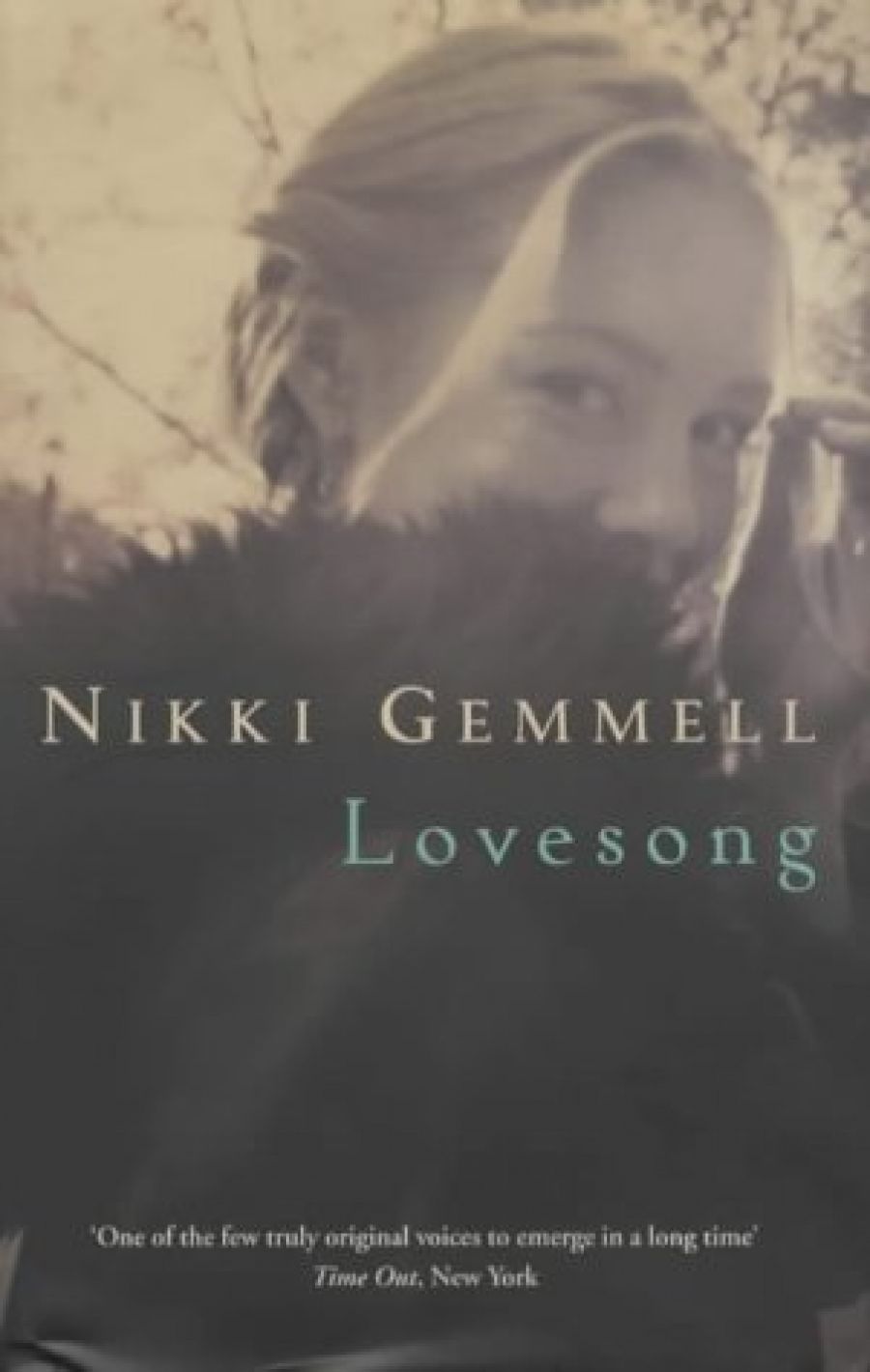
- Free Article: No
- Contents Category: Fiction
- Review Article: Yes
- Article Title: Energetic Love Song
- Online Only: No
- Custom Highlight Text:
Nikki Gemmell’s third novel, Love Song, set in both Australia and England, is a striking and memorable work. The style is sharp, jagged even, but so energetic that it sucked me in. I had to read it twice to know more than the fact that I had thoroughly enjoyed it.
This is a story written to an unborn child by a mother who seems, at first, both old and young, something which proves to be the case. She is Lillie, a girl who has survived the eccentric, cult-like community that incarcerated her, and who has survived the loss of her lover, the child’s father. She has survived a short life dogged by false accusation. She is also a young woman who, at the point of writing that old person’s document, her memoirs, is scarcely into her adulthood and is still inexperienced in the ways of the world. Her voice is fresh, young and oddly wise.
- Book 1 Title: Love Song
- Book 1 Biblio: Vintage, $29.95 pb, 247 pp
- Book 1 Cover Small (400 x 600):

- Book 1 Cover (800 x 1200):

There are many elements of Love Song that I would not normally like, in particular the way it wrestles with language, distorting and twisting nouns and adjectives to suit its purpose. This is too often poorly done in contemporary writing. Here, though, these distortions work, and the voice of Lillie – wild, vulnerable and supercharged – is evoked with immediacy and effect in this densely wrought, high-energy prose. And, rich as it is, it almost always carries us with it. Occasionally, I had to read a passage twice to follow its breathless rush, something that will not be forgiven by all readers.
The opening is deliberately ambiguous, an image fraught with panic and sensuality. By page two, we realise that the narrator is pregnant and that the significance of the mysterious opening seems to be conception. This cloudiness and misleading coding may frustrate some readers, but it does give the finely handled repetitions towards the end considerable potency.
There are many strengths, many beauties, to this book. Description of place, whether Australia or England, is striking – as original as Lillie herself, and given through her hot, intense voice. Lillie recalls Sunshine, the mountain home of the community, as: ‘A land singed by the sky … That light is in my bones: the way it’s tinged an apocalyptic yellow, pre-storm, or is bullet-hard with heat or sullen with rain, the way it drops from the clouds in great shafts at sunset like tent ropes from God.’ London is: ‘A city sullen under the thumb of a low, bloated sky. The River Thames is a vein from an old man’s temple … Outside, the cold. The light mealy, thin like gruel, and I can’t read the sky for it hangs like the water-bowed ceiling of an old house.’ The sky is a prominent motif in the book, but as something Lillie notices and identifies with, rather than as metaphor.
Sexuality is handled with naturalness and consistency, and without the self-consciousness I found in Cleave. Lillie is the strongest adolescent female character I can remember reading. Her uncontrollable sexuality, her desire for men, for sex, and her innocence are realised with candour and warmth. Her house arrest from age thirteen to twenty-one, rather than making a victim of her, intensifies the pressure her sexuality and love of life put on both her and the reader. Her incarceration also leaves her unprepared for the world but in love with it, and it is this rather frightening innocence and desire that give the book its pace and tension.
The plot loses some momentum and strength towards the end. I expected that Lillie’s clumsy first flight into the world, given her fire, would result in a different kind of tragedy, something she does rather than something that happens. Accidents are risky as plot elements in fiction, and some readers will find the narrative ultimately unsatisfying. It gains closure, perhaps too easily, in the end. But there is a terrific, well-sustained surprise before that. I won’t spoil it.
It has been said of so many writers that they have a highly individual or original voice that the words have lost meaning, but it is true of Nikki Gemmell. Love Song will reward a second reading with pleasure in its vigour and love for life and language.


Comments powered by CComment